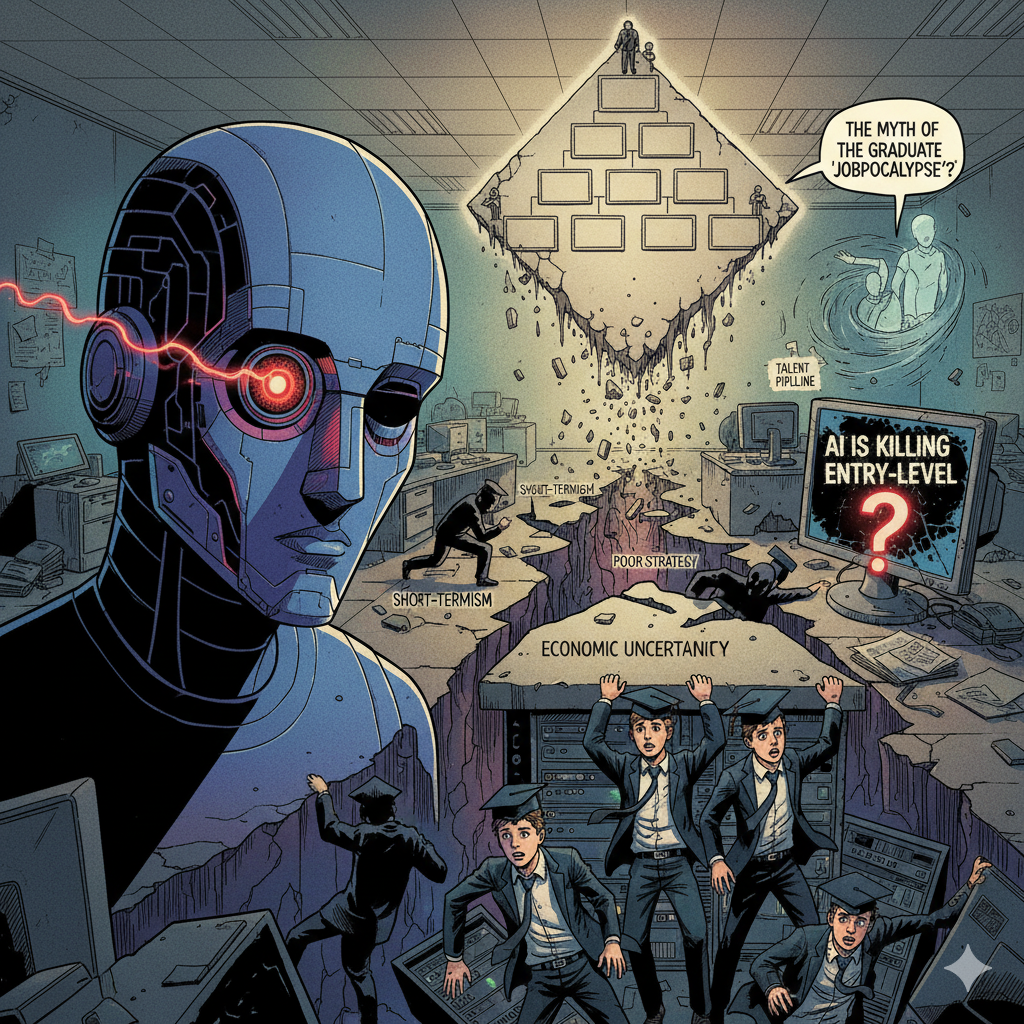Another day, another news story on how AI is already destroying graduate job opportunities. We see the headlines. We hear the warnings. Eventually we are repeating the mantra: AI is killing entry-level jobs. From law firms to accounting practices, the narrative is clear: automation is replacing junior roles, and the graduate pipeline is drying up.
But here’s the contradiction: while AI adoption is accelerating, many firms are still hiring, still training, and still struggling to fill roles. If AI is so disruptive, why hasn’t it delivered the promised efficiency gains or the mass layoffs?
The Problem: Misdiagnosing the decline 🤔
Everyone says AI is the culprit. Isabel Berwick’s FT Working It episode (no paywall on this one) captures this sentiment well: entry-level jobs are vanishing, and AI is doing 80% of what junior lawyers used to do. Jérémy Clédat, CEO of Welcome to the Jungle, observes:
“You see that this decline has been three times faster and higher than other positions for more senior people.”
Chris Eldridge, CEO of recruitment firm Robert Walters, adds:
“Companies just don’t want to risk their capital right now. And therefore, they’re just pausing the graduate intake. But that pause really has now lasted for two, two-and-a-half years.”
So here’s the twist: the hiring freeze began before generative AI went mainstream. Economic uncertainty, not AI, is the consistent factor. The result? A talent vacuum: not because AI replaced juniors, but because firms stopped hiring them.
So what’s really happening?
The Insight: AI is a convenient scapegoat 🔎
The real story is more nuanced. AI is not yet capable of replacing entry-level professionals wholesale. Most deployments are augmentative, not substitutive. Simmons & Simmons’ in-house tool “Percy” helps lawyers process documents, but as one partner explains:
“You’re never going to rely 100 per cent on what Percy tells you. I’ve still done that. But then what it’s allowed me to do is just ensure that the output that I’m creating is just that bit more accurate.”
Moreover, the skills AI supposedly replaces—repetition, analysis, admin—are precisely where juniors learn. Remove the “drudge work” and you risk hollowing out the learning curve. Julian Taylor, senior partner at Simmons & Simmons, warns:
“If we get too narrow at the entry point, I think that will create problems further down the line. It’s much easier to take your talent from your own trainees.”
The myth of AI-driven job destruction obscures a deeper issue: short-termism in workforce planning. Firms are experimenting, not transforming. And in doing so, they risk losing sight of the long-term value of training and development.
The Action: Reframe the narrative ✅
Instead of blaming AI, interrogate hiring strategy.
Try this:
- Before cutting junior roles, ask: what learning do they enable?
- Next time you hear “AI replaces X”, ask: what does it actually do—and what does it not do?
- Rather than fearing AI, use it to enhance rather than eliminate early career development.
If you thought AI was the villain, you may be surprised how often it’s just the alibi.
The Impact: A talent pipeline at risk 🚀
The real impact isn’t technological—it’s structural. Firms that pause hiring now will face a skills void in three to five years. The diamond-shaped org chart is a fantasy without a base. Apprenticeship models may return, but with troubling implications: fees, indentures, or long-term contracts that commodify training.
Isabel Berwick notes:
“Some people think that maybe that’s going to be a model for the future… a return of a kind of indentured labour.”
Meanwhile, graduates are questioning the value of university. If entry-level jobs disappear, what’s the point of a degree?
The kicker?
AI wasn’t the disruptor: it was the distraction. The real disruption is a failure to invest in people.
The Bottom Line: AI isn’t the problem. Blame poor strategy 📌
The conflict resolves simply: AI didn’t kill entry-level jobs. Poor strategic planning did.
☛ So let’s stop blaming the machines and start rethinking the model. What do you think—are we misreading the signals, or is the future of work already off course? ☚
A final thought: AI can (probably) not replace you in your job. But a salesman from an AI company with a billion dollar marketing budget can absolutely convince your boss that AI can replace you in your job….
About me: I help organisations turn complex data into clear decisions and commercial outcomes. My focus is on enabling better decision-making and unlocking new value through data-driven innovation – especially where the stakes are high and the problems are difficult and poorly defined.
Follow me on LinkedIn for more insights.
